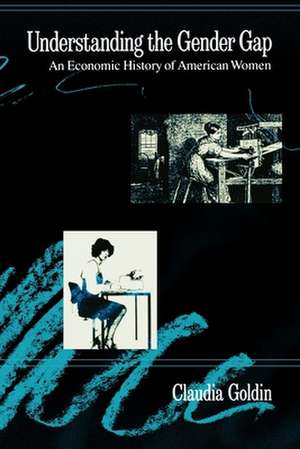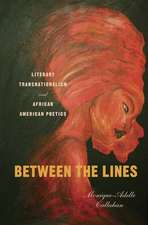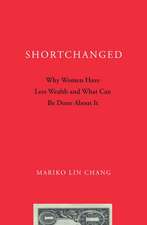Understanding the Gender Gap: An Economic History of American Women
Autor Claudia Goldinen Limba Engleză Paperback – 13 mai 1992
workplace and refuting the notion that women's employment advances were a response to social revolution rather than long-run economic progress. Employing innovative quantitative history methods and new data series on employment, earnings, work experience, discrimination, and hours of work, it
establishes that the present economic status of women evolved gradually over the last two centuries and that past conceptions of women workers persist.
Preț: 798.93 lei
Preț vechi: 1094.44 lei
-27% Nou
Puncte Express: 1198
Preț estimativ în valută:
152.87€ • 166.58$ • 128.82£
152.87€ • 166.58$ • 128.82£
Carte tipărită la comandă
Livrare economică 23 aprilie-07 mai
Preluare comenzi: 021 569.72.76
Specificații
ISBN-13: 9780195072709
ISBN-10: 0195072707
Pagini: 328
Ilustrații: line drawings, tables
Dimensiuni: 155 x 234 x 16 mm
Greutate: 0.45 kg
Editura: Oxford University Press
Colecția OUP USA
Locul publicării:New York, United States
ISBN-10: 0195072707
Pagini: 328
Ilustrații: line drawings, tables
Dimensiuni: 155 x 234 x 16 mm
Greutate: 0.45 kg
Editura: Oxford University Press
Colecția OUP USA
Locul publicării:New York, United States
Descriere
Using a unique set of data drawn from the US census, statistics, city directories, and other sources, the author looks at the differences between men and women in the US labour force. She shows that the `gender gap' in income and job level that has existed throughout history cannot be explained simply as a matter of sex discrimination, nor as a result of inherent structural phenomena in the employment market.
Cuprins
Chapter 1: Women's experience in the American economy; Chapter 2: The evolution of the female labor force: The measure of market work; Labor force participation of married women since 1890; Cohorts of white married women; Cohorts versus cross sections; Implications of cohort change; Cohorts of nonwhite married women; Life-cycle labor force participation and work experience; Direct measures of life-cycle work; Work experience, 1930-1950; Economic development and thelife cycle of work; Corrections to the 1890 data; Participation rates before 1890, married and adult women; Participation rates before 1890, single women; Single women in the labor force, 1890 to 1930; Summary: The work of women since 1790
Recenzii
`This book is both innovatory and stimulating and will break new ground for those not familiar with some of Goldin's 18 articles on women in the American economy. It is essential reading and should head any historian's personal reading list.'Economic History Review
`a milestone in women's history. This is a piece of outstanding scholarship based on exhaustive primary research and a high level of economic reasoning ... economic history as it should be.'Business History
`This is a piece of outstanding scholarship based on exhaustive primary research and a high level of economic reasoning which has the courage to attack head-on the three most difficult questions in women's economic history ... By establishing the facts, by applying economic rigour and by firmly establishing the importance of cohort analysis in women's economic history, Goldin has succeeded in answering all her questions. Understanding the Gender Gap iseconomic history as it should be.'Business History
'Goldin and her team of research assistants have not only confirmed wide and large-scale discrimination, but have added new and more positive information on America's working women.'Economic History Review, Aug '91
`a milestone in women's history. This is a piece of outstanding scholarship based on exhaustive primary research and a high level of economic reasoning ... economic history as it should be.'Business History
`This is a piece of outstanding scholarship based on exhaustive primary research and a high level of economic reasoning which has the courage to attack head-on the three most difficult questions in women's economic history ... By establishing the facts, by applying economic rigour and by firmly establishing the importance of cohort analysis in women's economic history, Goldin has succeeded in answering all her questions. Understanding the Gender Gap iseconomic history as it should be.'Business History
'Goldin and her team of research assistants have not only confirmed wide and large-scale discrimination, but have added new and more positive information on America's working women.'Economic History Review, Aug '91










